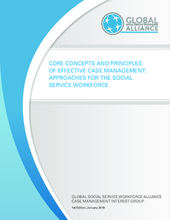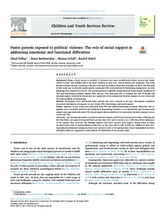Displaying 321 - 330 of 507
Developed by members of the Global Social Service Workforce Alliance’s Case Management Interest Group, this resource aims to define case management.
This research provides insight into the current intervention strategies used by social workers in emergency child protection, whereby children are removed from their caregivers as a result of abuse and are placed at child and youth care centres.
The article presents the results of an empirical pilot study carried out on a sample of 24 child protection social workers employed in four public agencies in Italy.
Este llamado pide a los gobiernos nacionales y locales, en coordinación con socios nacionales y globales, fortalecer la fuerza laboral del servicio social para mejorar los resultados de protección, salud y bienestar para niños, niñas, jóvenes, familias y comunidades como se describe en los Objetivos de Desarrollo Sostenible.
Catholic Relief Services’ (CRS) Holistic Organizational Capacity Assessment Instrument (HOCAI) is designed to assist organizations to conduct a self analysis of their strengths and challenges, develop an action plan, and improve organizational functions through capacity strengthening. With HOCAI, CRS creates a standardized framework to help organizations engage in a process of continuous assessment and improvement that will sustain organizational capacities.
Because foster parents play a critical role in supporting children in foster care, who often have experienced trauma, the Casey Foundation developed ARC Reflections, a nine-session program that child welfare agencies can use to train foster parents to better care for children who have had traumatic experiences.
This report aims to address some common and key themes emerging from a questionnaire and in-person meeting to discuss the role of the social service workforce in the inclusion of migrant children and young people.
For many social workers, participatory practice may seem an unachievable goal, particularly in the field of child protection. This paper discusses a significant programme of change in one London local authority, as part of which the authors undertook 110 observations of practice and provided more than eighty follow-up coaching sessions for workers.
The first goal of this study was to describe posttraumatic symptoms (PTS) and problems in functioning among foster parents following their exposure to the war.
In this article, child protection managers and direct service workers in Saudi Arabia report their experiences in implementing new policies.






